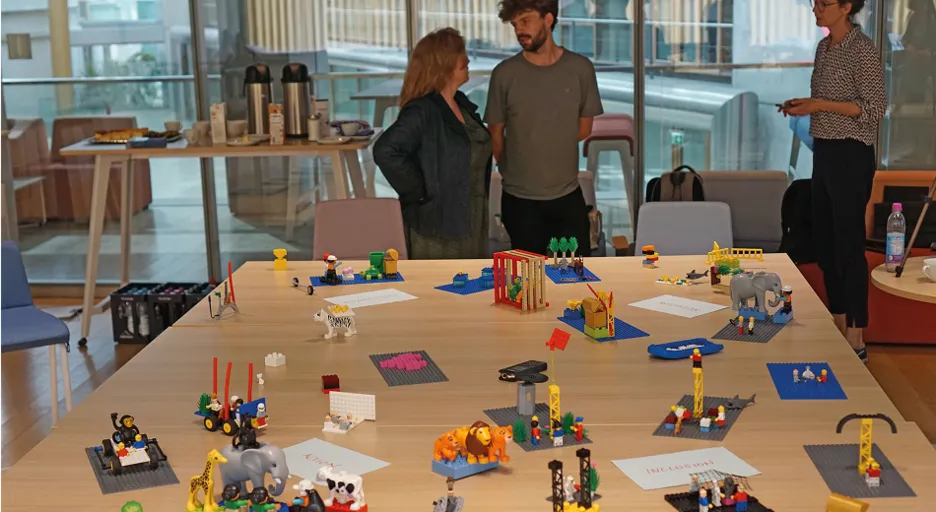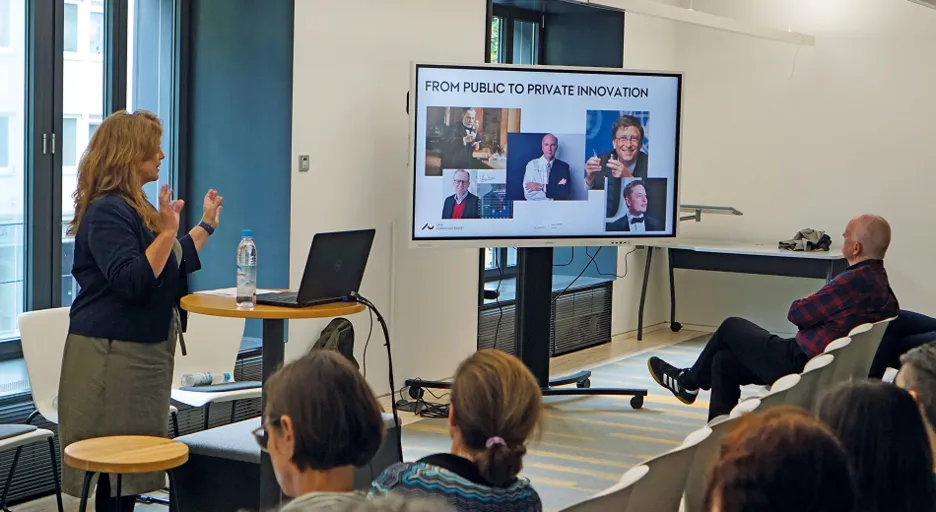Working toward responsibility in innovation communication
This Focus Group investigated the role of communication in shaping public perceptions of and research on artificial intelligence (AI) in Germany. Through a media analysis, expert interviews, and an interdisciplinary workshop, it approached the question of what responsible innovation communication might look like in a charged communication environment that is marked by strong hopes but also fears.

Focus Group: Responsible Innovation Communication
Prof. Maja Horst (Aarhus University), Alumna Hans Fischer Senior Fellow | Dominic Lammar (TUM), Doctoral Candidate | Host: Prof. Ruth Müller (TUM)
(Image: Lars Kruse, AU Foto)
Communication plays a key role in in the development and implementation of emerging technologies in society [1]. It is not only necessary to generate resources because researchers need to “sell their ideas” to generate funding, gain institutional support, and attract partners for collaboration. Communication is also crucial to the way in which society and citizens make sense of, and react to, new technologies. For instance, public narratives around nuclear power, genetic technology, and artificial intelligence are crucial for the social acceptance of – or opposition to – such technologies. However, while there is a vast literature regarding matters of responsible research and innovation (RRI), it has tended to under-emphasize the role of communication.
Since its founding in 2021, this Focus Group has taken public communication around artificial intelligence (AI) in Germany as an empirical field to investigate what responsible innovation communication might mean. Public expectations and debates around AI are a particularly pertinent place to trace questions around responsibility, because they are marked by high levels of hope as well as fear. At the same time, TUM constitutes an excellent place for such investigations because of the breadth of AI research(ers) it is home to.
Figure 1

Empirical work
In a first step, we conducted a media analysis to identify the broader themes and concerns present in German public debates around AI. We consciously decided against further defining what AI is or is not, because we were precisely interested in how news articles understand and describe this phenomenon. In our analysis, we identify two distinct discourses around AI. We show that AI is often either described in a highly abstract fashion (“AI will cause a technological revolution”) or a highly contextual manner (“researcher X uses model Y to solve problem Z”), and we trace how technology hype around AI emerges in the interaction between these two ways of describing AI. The manuscript resulting from this work package is currently under review.
Drawing on these findings, we then engaged in interviews with AI experts themselves. In these semi-structured interviews, we trace how experts perceive the wider debates around their field of investigation and how they engage with public concerns as well as hopes. Our interest here lies in understanding how narratives around an emerging technology like AI can affect scholars’ everyday research and communication practices. A manuscript currently in progress will foreground the communication practices our interviewees identify as effectively “selling” their work to funders, policy makers, and the wider public without engaging in what they consider over-extrapolations of limited findings.
We complemented these interviews by conducting a workshop in which participants of diverse backgrounds (public relations practitioners, scientific experts developing medical AI systems, social scientists working on public communication) explicitly discussed what it might mean to communicate responsibly around AI. The workshop was facilitated by an external moderator using Lego Serious Play Methodology as a way to engage all participants in an open and constructive exchange.
Public and interdisciplinary outreach
At the same time, the different members of the Focus Group have presented and discussed their work in a variety of other settings, thus making their findings available to relevant groups of stakeholders across and beyond leading academic institutions. For instance, Maja Horst has spoken on the importance of responsible innovation communication as part of her Linde Lecture at the TUM-IAS General Assembly (2022) and during her keynote lecture at the EuroTech Alliance’s Tech4Society anniversary celebration in Brussels. Her Host Ruth Müller engaged with the topic of innovation communication during a panel event at the Tandon School of Engineering in New York.
To mark the end of the Focus Group at TUM itself, we organized a panel discussion on responsible innovation communication to foster discussion among different stakeholders across this university. The event was kicked off by a keynote by Maja Horst and followed by a discussion between the panelists featuring, among others, Ulrich Marsch, managing director of TUM-IAS, and Jeanne Rubner, TUM Vice President for Global Communication and Public Engagement.
Future research
In the long run, the findings from this Focus Group will inform Maja Horst’s further work on a broad theoretical framework for understanding innovation communication as a crucial dimension of RRI. At the same time, the results from our interviews and the workshop on responsible innovation communication build a basis for further engagement with the topic, for instance in the form of developing communication guidelines for responsible communication at TUM itself.

[1]
Davies, S. R. & Horst, M. : Science communication as culture: a framework for analysis. Bucchi, M. & Trench, R. (Eds.): Handbook of public communication of science and technology. Routledge (2021).
Selected publications
- Etiquette, S., Behrent, F. & Horst, M.. Data, AI and governance in MaaS – leading to sustainable mobility? Transportation Research: Transdisciplinary Perspectives 19, 100806 (2023).
- Krarup, T. & Horst, M. European Artificial Intelligence Policy as Digital Single Market Making. Big Data & Society 10(1) (2023).
- Horst, M. Science Communication as a Boundary Space: An interactive installation about the social responsibility of science. Science, Technology and Human Values 47(3), 459–482 (2022).
- Lammar, D., Horst, M. & Müller, R. AI in the German Media: Narratives of AI-in-Particular and AI-in-General in German Media Reporting about Artificial Intelligence. Digital Journalism, special Issue Covering AI amidst the Hype (forthcoming).
- Holohan, M. & Müller, R. “Beyond humanism: telling response-able stories about significant otherness in human–chatbot relations.” Frontiers in Psychology 15 (2024).